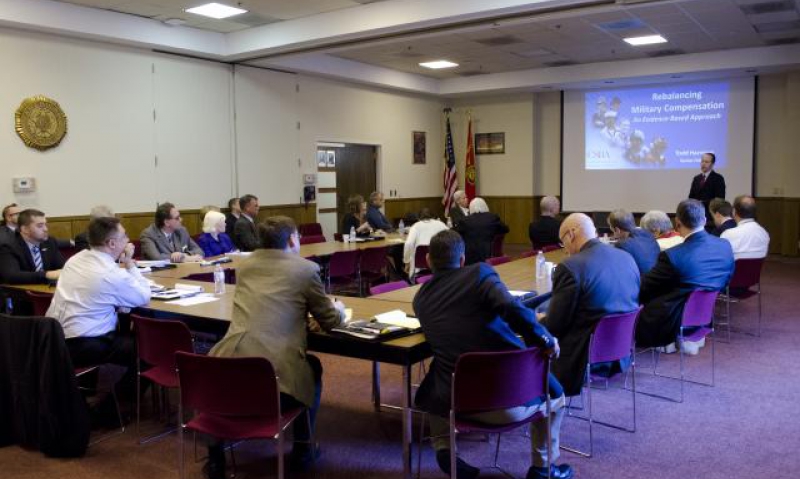
Military and veterans service organizations gather to discuss common legislative priorities.
On October 18, representatives from a number of military and veterans’ service groups met to discuss their collective legislative priorities as they relate to the military’s active duty and retirement pay, TRICARE (military health insurance) premiums, military and veterans’ benefits, and the continuing effects of sequestration.
The focus of The American Legion-hosted Military and Veterans Benefits Summit in Washington was summarized succinctly by the Veterans of Foreign Wars’ Public Affairs Director Joe Davis.
"The way I see it, we are here to preserve the all-volunteer force," Davis said. Others agreed, stating that reverting to conscription to maintain an adequate fighting force would be unaffordable.
"Plus, those who serve want to serve with others who want to serve," said one panelist. All agreed that the two keys to maintaining a credible, all-volunteer force are recruitment and retention; these being driven by incentives – such as pay and benefits – to join and remain in the military.
Participants in the summit were united in their concern that a cost-conscious Congress will be prevailed upon to compromise military pay and benefits, as well as veterans’ benefits, thus threatening the budgets of the Department of Defense (DoD) and Department of Veterans’ Affairs (VA). Guests were invited to present their points of view regarding this possibility. One invitee was Todd Harrison, senior fellow for defense budget studies at the Washington-based Center for Strategic and Budgetary Assessments. He was asked by the Legion and colleague agencies to present a summary of his self-commissioned, scientifically driven study, "Rebalancing Military Compensation, an Evidence Based Approach."
Harrison’s privately funded work was based on survey answers from 2,655 active-duty servicemembers. The respondents – catalogued in junior enlisted, senior enlisted, junior officer and senior officer groups – were asked to rank pay, health-care benefits, retirement benefits and other military recruitment and retention incentives in order of relative importance. The results, not unlike those to be expected in the civilian population, demonstrated that younger servicemembers are more directed toward short term rewards and older ones more concerned with longer term investments of time, service and finances.
Catering to and balancing these two, distinct wishes, Harrison said, is a challenge that must be met. "Without change," he said, "the Department of Defense could be faced with a precarious dilemma." In the executive summary of his report Harrison said, "The all-volunteer force, in its current form, is unsustainable. Over the past decade, the cost per person in the active-duty force increased by 46 percent, excluding war funding and adjusting for inflation. If personnel costs continue growing at that rate and the overall defense budget remains flat with inflation, military personnel costs will consume the entire defense budget by 2039."
Harrison recommended strongly that the DoD conduct a study, or series of studies, similar to his but on a larger, more representative scale.
Also present at the Legion’s Military and Veterans Benefits Summit were several staff members from the congressionally mandated Military Compensation and Retirement Commission. The nine member commission, a product of the Fiscal Year 2013 Defense Authorization Bill, was charged by President Obama with reviewing all military compensation, benefits and retirement finances and issuing a report to him and Congress. The commissions’ findings and recommendations could strongly influence future defense spending. Some within the military and veterans’ support communities have articulated fears that the commission’s work could have a largely negative impact on Pentagon and, by extension, VA, budgets. Commission spokesperson James Graybeal sought to quell concerns by stating that the "commission is not set out as a cost-cutting group."
Legion Legislative Director Lou Celli, who moderated the four-hour gathering, expressed concern that the commission, which comprises two former U.S. senators, two former congressmen and several Pentagon veterans, will be working too hastily to meet a very short deadline.
"You will have to gather data, examine the data, formulate a report and write it within six months from now," Celli said, "Normally, a commission of your type would be well into the writing stage by now."
"We are well aware of the challenge," Graybeal said.
The Legion-assembled group plans to meet again in the winter, possibly in February, to continue its discussions and formulate a legislative lobbying plan.
- Legislative

